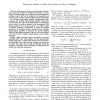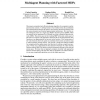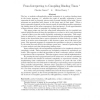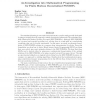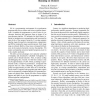361 search results - page 35 / 73 » Approximate counting by dynamic programming |
CDC
2010
IEEE
13 years 2 months ago
2010
IEEE
This research concerns a noncooperative dynamic game with large number of oscillators. The states are interpreted as the phase angles for a collection of non-homogeneous oscillator...
NIPS
2001
13 years 9 months ago
2001
We present a principled and efficient planning algorithm for cooperative multiagent dynamic systems. A striking feature of our method is that the coordination and communication be...
ESOP
1990
Springer
13 years 11 months ago
1990
Springer
The key to realistic self-applicable partial evaluation is to analyze binding times in the source program, i.e., whether the result of partially evaluating a source expression is ...
JAIR
2010
13 years 6 months ago
2010
Decentralized planning in uncertain environments is a complex task generally dealt with by using a decision-theoretic approach, mainly through the framework of Decentralized Parti...
ISCAPDCS
2004
13 years 9 months ago
2004
FG is a programming environment for asynchronous programs that run on clusters and fit into a pipeline framework. It enables the programmer to write a series of synchronous functi...
